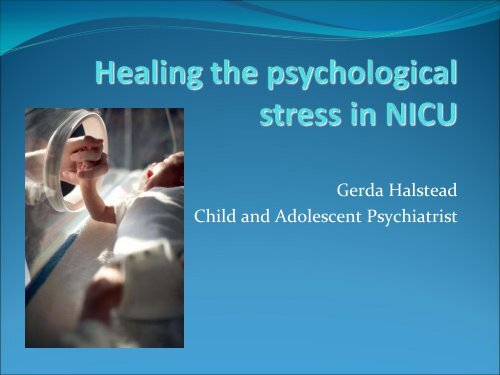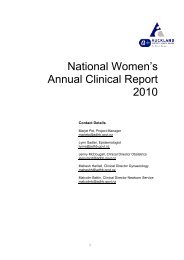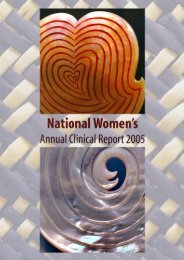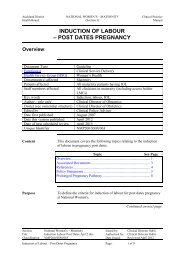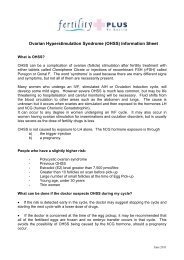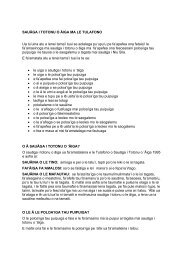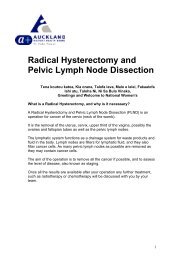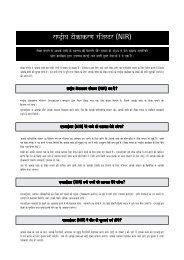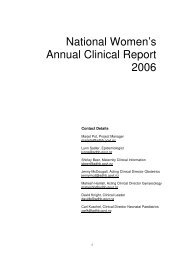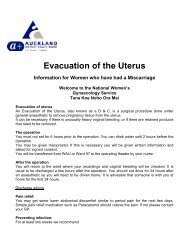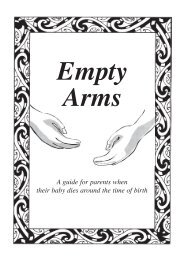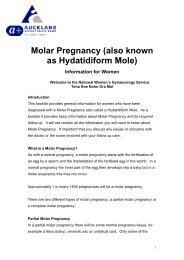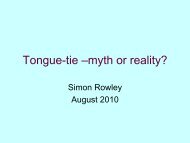Gerda Halstead Child and Adolescent Psychiatrist - National ...
Gerda Halstead Child and Adolescent Psychiatrist - National ...
Gerda Halstead Child and Adolescent Psychiatrist - National ...
Create successful ePaper yourself
Turn your PDF publications into a flip-book with our unique Google optimized e-Paper software.
<strong>Gerda</strong> <strong>Halstead</strong><br />
<strong>Child</strong> <strong>and</strong> <strong>Adolescent</strong> <strong>Psychiatrist</strong>
Our Team<br />
<br />
<br />
<br />
<br />
<br />
<strong>Gerda</strong> <strong>Halstead</strong> <strong>Child</strong> <strong>and</strong> <strong>Adolescent</strong> <strong>Psychiatrist</strong><br />
Toni Shepherd Psychotherapist<br />
Lara Mulgrew <strong>Child</strong> Psychotherapist<br />
Vicki Taylor <strong>Child</strong> Psychotherapist<br />
Consult Liaison Psychiatry Team, Starship
Aims<br />
<br />
<br />
<br />
<br />
<br />
Our work –types of referral<br />
Sources of parent psychological distress in NICU<br />
Evidence base<br />
Interventions<br />
Thoughts for the future
Roles –<br />
<br />
<br />
<br />
Parent mental health<br />
support <strong>and</strong> input for:<br />
Parent‐infant relationship<br />
Staff working with stressed families
“Please see this family for support<br />
in their journey through NICU”<br />
<br />
1.<br />
Miles (1989) identified 4 specific aspects of NICU with<br />
potential to be highly stressful:<br />
NICU physical environment<br />
2. Infants physical appearance <strong>and</strong> behaviour<br />
3. Staff <strong>and</strong> parent interactions<br />
4.Alteration in the parental role
Parents speak ..<br />
<br />
<br />
“… I mean it was like our own child, but we didn’t<br />
know what we could do with her. Its kind of a strange<br />
feeling where she’s yours but you have to ask<br />
permission to do things” (from Kenner & McGrath,<br />
2004)<br />
“Imagine the nurse pulls back the Saran Wrap for you<br />
to touch him, <strong>and</strong> you just can’t bring yourself to do<br />
this, for your finger is longer <strong>and</strong> thicker than his<br />
arm, <strong>and</strong> his h<strong>and</strong> is only the size of your fingertip”<br />
(from Maroney, 2004)
Metaphors for the journey<br />
Aagard <strong>and</strong> Hall (2008)<br />
<br />
<br />
<br />
<br />
<br />
“From their baby to my baby”<br />
of the parental role)<br />
“striving to be a real, normal mother”<br />
(acquiring more control<br />
Environmental influences “from the foreground to the<br />
background”<br />
Role evolution “from silent vigilance to advocacy”<br />
Relationship with staff “from continuously answering<br />
questions to sharing knowledge”
Common themes in parents<br />
experiences of NICU<br />
• Trauma of pre‐term birth “shell‐shocked”<br />
• Fear of infant death<br />
• Guilt /shame<br />
• Coping with the NICU environment<br />
• Coping away from home <strong>and</strong> supports<br />
• Mothers own medical needs –<br />
‘falling through the<br />
gaps’<br />
• What is expected of me?<br />
• Grief re diagnosis, loss of twin, normal pregnancy<br />
experiences
•Anger <strong>and</strong> mistrust secondary to perinatal<br />
experiences<br />
•Underst<strong>and</strong>ing medical information <strong>and</strong> who to<br />
listen to (including seeking outside information)<br />
•Parent roles “who does this baby ‘belong’<br />
to?”, am I<br />
good enough? How can I be a parent in NICU?<br />
•Separation from baby “is this nurse a safe pair of<br />
h<strong>and</strong>s?”<br />
•Milk supply
Common themes for parents in<br />
NICU<br />
<br />
<br />
<br />
<br />
<br />
Transition level 3 to 2 often hard<br />
Helping siblings cope<br />
“Why is this parent not coming in ?” Resources, ?<br />
Avoidance (coping style or PTSD), ? Mental health<br />
issues, ? Cultural, ? Attachment history ?<br />
Disempowered/role adjustment<br />
Stress associated with the ‘long haul’<br />
Often increased anxiety in PIN
An initial approach to parents<br />
“Meet <strong>and</strong> greet” introduction to service vs. in depth<br />
interview<br />
Acknowledge <strong>and</strong> normalise stressors<br />
Underst<strong>and</strong>ing their personal situation<br />
Acknowledge their role as parents, explore positives<br />
<strong>and</strong> difficulties<br />
Meet their infant <strong>and</strong> ask what they have learned<br />
about her medical condition or him as an individual<br />
Ask about relationships with staff, preferences re<br />
information
Approach to parents …<br />
<br />
<br />
<br />
<br />
<br />
Ask about physical state<br />
Ask about social supports<br />
Ask about usual coping strategies<br />
Brief screen for mental health issues<br />
Discussion regarding self‐care, help with problem‐<br />
solving, permission to discuss fears <strong>and</strong> “dark<br />
feelings”, relaxation skills, couple work, advice re<br />
siblings
Parental vulnerabilities<br />
<br />
<br />
<br />
<br />
Parental mental health<br />
<br />
<br />
Impact on capacity to relate to infant <strong>and</strong> to staff<br />
Difficulty accessing services<br />
Cultural misunderst<strong>and</strong>ings<br />
<br />
<br />
hospitals largely run <strong>and</strong> staffed by Pakeha<br />
Assumptions re family roles, childcare practice<br />
Previous history of trauma <strong>and</strong> loss<br />
<br />
<br />
<br />
Pregnancy loss, IVF<br />
Previous experiences in the hospital system<br />
Own hx of abuse <strong>and</strong> disrupted attachment<br />
Domestic/family violence<br />
<br />
Care <strong>and</strong> protection issues, difficulties achieving a therapeutic<br />
focus <strong>and</strong> service coordination
Issues for staff<br />
<br />
<br />
<br />
<br />
<br />
<br />
Balancing of roles, expertise <strong>and</strong> control<br />
Technological <strong>and</strong> procedural imperatives<br />
<br />
Easier to measure/operationalise<br />
Communication skills <strong>and</strong> challenges<br />
<br />
instrumental care<br />
managing communication difficulties, breaking bad news<br />
Personal discomfort with parents/families from different<br />
cultures who hold different values <strong>and</strong> priorities<br />
Stress of close contact with anxious, distressed, unwell or<br />
angry family for 12 hours at a stretch<br />
Vicarious trauma
“we are concerned about the staff‐family<br />
relationship”<br />
<br />
<br />
<br />
<br />
<br />
<br />
<br />
–<br />
parent factors<br />
Acute stress –fight‐flight‐freeze<br />
Loss of control<br />
Vigilance/ “watching over” – being alert to indications of safety<br />
<strong>and</strong> wary of circumstances signaling danger for baby in NICU<br />
Personality styles <strong>and</strong> premorbid difficulties with emotional<br />
regulation<br />
Difficulties with trust <strong>and</strong>/or adverse past or perinatal<br />
healthcare experiences<br />
Projection<br />
Information processing – stress, mental illness, ASD
“We are concerned about parents<br />
mental health”<br />
<br />
<br />
<br />
Pre‐existing illness – liaison role with MMH, adult<br />
MH<br />
Depression <strong>and</strong> anxiety – increased incidence in<br />
parents of premature/LBW infants at least in first 12<br />
weeks. May be as high as 40% (systematic review,<br />
Vigod et al 2009)<br />
Christchurch NICU (Carter, Mulder <strong>and</strong> Bartram,<br />
2007) 22% clinically significant depression <strong>and</strong> 18%<br />
clinically significant anxiety (controls 12% <strong>and</strong> 7%)<br />
Increased anxiety <strong>and</strong> depression no longer present<br />
by 9 months
Parental Mental Health<br />
<br />
<br />
<br />
Vigod et al – Mothers of very premature/VLBW<br />
babies consistently demonstrated to have higher<br />
levels of depressive symptoms through first year.<br />
Ongoing infant illness, low social support risk factors<br />
PTSD – increased at 2‐3 years particularly in the<br />
VLBW group
“we (or the parent) are concerned about<br />
the parent‐infant relationship<br />
<br />
<br />
<br />
<br />
<br />
<br />
Prematurity per se doesn’t confer added risk of insecure<br />
attachment<br />
Risk may be increased for infants with neurological<br />
damage or high medical risk<br />
Parents may worry about ability to bond with infant<br />
VLBW infants very different to a term baby as a ‘social<br />
partner’<br />
Premature infants may have difficult to read cues, less<br />
mature regulation<br />
High parental anxiety or depression can affect sensitive<br />
responding
High risk families<br />
<br />
<br />
<br />
<br />
<br />
<br />
<br />
Distorted representation of the infant<br />
Parental preoccupation with past trauma<br />
Deficits in interpretation of infants emotional<br />
communication<br />
Limited reflective capacity<br />
Observations: non‐contingent responses, role confusion,<br />
negative‐intrusive behaviour, frightening/frightened<br />
behaviour<br />
These predict infant disorganised attachment<br />
Usually indicate personality disorder or severe trauma<br />
history in parent
Interventions<br />
<br />
<br />
<br />
<br />
<br />
Providing a therapeutic relationship<br />
Containment of distress<br />
Liaison with <strong>Child</strong> Protection <strong>and</strong> other child<br />
agencies<br />
Referral to Adult Mental Health<br />
Referral to Infant Mental Health
Other areas of involvement<br />
<br />
<br />
<br />
<br />
<br />
<br />
Distressing news meetings<br />
Antenatal involvement<br />
Bereavement<br />
After transfer to Starship<br />
Education<br />
Supervision/debriefing
The future<br />
<br />
<br />
<br />
<br />
<br />
Formal psychosocial assessments<br />
Written resources for parents<br />
? More formalised program egg COPE/NICU (Melnyk<br />
& Feinstein, 2008)<br />
Improving links with other agencies<br />
Ongoing progress toward family‐centered care –<br />
sibling playroom, places to rest for parents.
The Healing Relationship<br />
“any relationship that enhances the process of<br />
recovery, repair <strong>and</strong> return to wholeness<br />
through characteristics such as<br />
communication, caring, compassion,<br />
empathy, rapport <strong>and</strong> support”<br />
Samueli Institute, 2002


